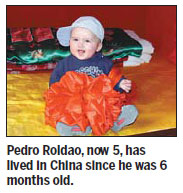FAQs about 3rd-culture children
Updated: 2014-06-22 07:32
(China Daily)
|
|||||||
Mixed Blessings: A Guide to Multicultural and Multiethnic Relationships' co-authors, counselor Harriet Cannon and mental health provider consultant Rhoda Berlin, answer frequently asked questions they've encountered in their combined 50 years of working on international identity issues.
Should parents encourage third-culture kids to integrate into Chinese culture?
Yes and no. Understanding cultural norms and the language in the region where you live builds confidence and positive experiences. At the same time, it is essential for parents to consciously maintain a passport-country identity in the home so children grow up with cultural grounding.
All TCKs have some cultural-identity conflicts. Parents can reduce the negative effects by consciously, consistently keeping literature, movies, games, food and holiday traditions from the home culture integral parts of the family fabric.
We call this cultural refueling. For a positive sense of self, we all need it like a car needs gasoline.
Be prepared for resistance from your children the longer they live internationally.
If parents have different passport identities, can you keep both cultural identities in the family?
Yes. For a start, Bilingual: Life and Reality by Francois Grosjean is a great resource for multilingual parents raising TCKs. When you keep language alive in the home, you keep the nuances of the culture alive. In addition, our book Mixed Blessings: A Guide to Multicultural and Multiethnic Relationships has tips for parents raising multicultural children.
As parents, how do we deal with our feelings when our children don't seem to care about our homeland?
Expat parents need to accept culture loss and grieve the fact that their TCKs will never look upon the home culture with the same loyalty. This can be very painful.

The cultural norms of the host country in which a child grows up will always eventually win out over the norms of the home country. A TCK will be fluidly bicultural or tricultural, or more, while the non-TCK expat adult is forever emotionally bonded to the home or passport culture.
Do TCKs have culture loss?
Yes. The extent of the culture loss varies with the child's personality and the age at which he or she moves to the next country. Parents can help children with culture loss by bringing favorite foods, books and other touchstones the child has collected from both the current and home cultures. Making home movies and scrapbooks to mark memories will help the TCK integrate a multicultural self-identity in a healthy way.
Are TCKs who go "home" to university at risk for adjustment problems?
Yes. The transition to university is a high-risk time for TCKs. Even if the child is an excellent student, and many are, they're going to a "foreign country" without the support of the close expat family that has been their primary support system and an international school that understands TCK multicultural identity.
- Erik Nilsson
(China Daily 06/22/2014 page3)